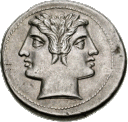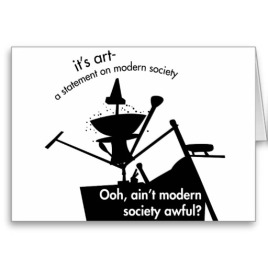Two faced
Roman god of beginnings and transitions, Janus guarded gates, doors and passages. He looked in both directions. Often represented as two-faced, he gazed to the future and the past. January owes its name to him, at once supervising New Year’s Eve and New Year’s. He was his own opposite number. He’d have made a great politician.
In a previous blog post, I discussed ways in which ‘awful’ has transmogrified into ‘awesome’. In an even earlier post, I mentioned in passing the phenomenon of contronyms. Not long ago, when ‘awful’ still kept its earlier meaning it also had today’s meaning. It functioned as an auto-antonym, a word with an alternative meaning that is also its own opposite. Like the Roman god, it looks both ways. Examples include: ‘bolt’ (to secure and to dash away), ‘buckle’ (to secure or to collapse), ‘fast’ (firmly fixed or moving quickly), ‘hold up’ (to support or to hamper), and ‘sanction’ (to endorse or to punish). Auto-antonyms are also known in linguistics as contronyms (or contranyms), self-antonyms, antilogy or antagonyms. Is it any wonder that Janus words change their meaning over time? Today we may hear ‘wicked’ for either very bad or very good, and ‘sick’ for both poorly and excellent.
Ours is a damn confusing language. When ‘flammable’ means ‘capable of burning,’ can any student of English as a second language be blamed for concluding that ‘inflammable’ must therefore mean the opposite? Nope. They both mean the same. For an antonym, the student must resort to ‘fireproof,’ which suggests the opposite meaning to ‘proof of flammability’. Janus has switched faces again. Contronyms are legion and legendary.
We can dust a house to remove the dust. Or we can dust for fingerprints, meaning that we spray more dust, which will require dusting later. We can have oversight of a function but we must be vigilant in case of an oversight leading to errors. In music we can refrain from making a sound until the refrain. We can replace a mis-filed book in its rightful place or we can replace it with an entirely different book. Electricity can be turned off until it comes back on, at which time the alarm might go off until we turn it… off. Meanwhile a big-boned butcher can bone a chicken, meaning to remove the bones. A politician can be cool one day but receive a cool reception the next. Uncool. One critical aspect of success (positive) could be received in a critical way (negative). Someone who disposes of garbage could be well disposed to his job. An enduring career could include many tedious efforts of enduring.
Such contradictory meanings are a gift for word-play comedians like the Marx Brothers (‘Time flies like an arrow. Fruit flies like a banana’) but they’re a nightmare for learners. ‘Fearful’ can mean causing fear or being filled with fear. It cuts both ways. ‘Livid’ can be greyish and bruise-coloured or else red and flushed. Which is it? ‘Moot’ can be either debatable or irrelevant. This is not a moot point. As for a word like ‘original,’ it can mean untouched and virginal like a factory setting, or else entirely new and creative. Which one do we mean? If the lights are ‘out’ that means darkness but if the stars are out, let there be light. ‘Outstanding’ is either exceptional or unresolved. Which? ‘Qualified’ is limited or skilled. Can’t be both, can it? ‘Reservation’ is both a confirmation of availability and a fearful doubt. ‘Screening’ is either a public display or else concealment. Quite the contradiction. To ‘stay’ an execution is to prevent it but to ‘stay’ the course means to persevere. In most sports ‘to strike’ means to hit but in baseball it means to miss. We can ‘trim’ the tree at Christmas (adding) or ‘trim’ the hedge (removing). A ‘vault’ can be a locked box or a wide-open night sky.
How does anyone learn this language when you can proudly receive a ‘citation’ (reward for good behaviour) or shamefully receive a ‘citation’ (penalty for bad behaviour)? I can be on a train bound for Sydney (moving) while bound in rope (unable to move). After I left (departed) my school there were others left (remaining). I can ‘give out’ oxygen tanks to scuba divers but the tanks will only last until the air ‘gives out’. I can be the very model of a modern train conductor but my railway might be a mere model. You can rock my world, unless I am a rock and an island.
English is so damned confusing. I don’t know whether to wind up the engine of debate or wind up the debate. These mixed metaphors are confusing enough if I have to surf a web and avoid trolls while posting. Think I’ll leave off leaving off and let myself off without let or hindrance.
Totally awesome or perhaps not
How many plays did Shakespeare write? The first folio of 1623, published seven years after his death, contained thirty-six plays (minus Pericles and Two Noble Kinsmen). Thereafter for some three centuries, scholarship enjoyed a broad consensus (except for those sceptics who claimed the bard was a beard for either Francis Bacon, Edward DeVere the Earl of Oxford or Christopher Marlowe): William from Stratford had a hand in the thirty-eight plays attributed to him.
Then along came Shakespearean apocrypha, comprising works to which the jobbing London playwright may well have added his quill. There’s plenty of evidence that Mr WS helped out promising newcomers like Beaumont, Fletcher, Middleton, Rowley and Webster, as well as old hands Kyd, Nashe and Peele. Will’s workshop collaborations include Edward III (provisionally admitted to the theatre canon in the 1990s), Sir Thomas More (joined the club in the early 2000s), Edmund Ironside (still in debate) and more recently Double Falsehood (2011). There’s also the lost play Cardenio and perhaps another called Love’s Labour’s Won.
All very interesting but the above is by way of a preamble to place a single word in context. Ain’t it awful? Well, yes. Quite. And quote. Here’s the relevant extract, from Sir Thomas More. Act 4, Scene 4: ‘How shall his garment, then, or the loose points that tie respect unto his awful place, avoid destruction?’
There we have it: ‘awful’. Full of awe. How potent a word it used to be! ‘Awful’ punched above its two-syllable weight. Once upon a time the word hit hard, signifying terror (back in the day, when ‘terrific’ used to be an adjective with punch). Not any longer. Now ‘awful’ is just plain awful. Down on its luck, it goes begging for respect. It has moved from the posh neighbourhood of ‘appalling,’ ‘reverential’ and ‘exceedingly great’ to a seedy suburb on the outskirts of respectability. Shakespeare wouldn’t touch the thing now with a bard’s pole. Ain’t it awful?
Yet we still have need of it. We use ‘shock and awe’ (also called ‘rapid dominance’) as a doctrine denoting overwhelming force strike, thanks to the US military. And so, as an adjective, we’ve elevated ‘awesome’. It does ok. In spite of overuse in Hollywood-influenced surfer culture (‘whoa, awesome, dude’) the replacement ‘awful’ retains power and might. We need ‘awesome’ to describe our inspiration and our excitement. We need it to evoke a sense of wonder. ‘Awesome’ still outranks ‘cool,’ ‘sexy,’ and ‘excellent’. It remains hotter than ‘hot’ and more epic than ‘epic’. But it lacks the dark side that ‘awful’ reflected.
Just as ‘fantastic’ has lost its sheen and ‘wonderful’ has slipped down a rung or two, ‘awesome’ no longer evokes a sense of dread mingled with admiration. We would not, for example, describe Satan or Moby Dick or Professor Moriarty as ‘awesome’ with a tinge of terror in our inflection. And like ‘awe,’ it has lost the old tang of mortal fear in the face of the numinous. Devalued currency, ‘awesome’ is often trotted out as another synonym for ‘very good,’ while to be ‘in awe’ suggests no more than admiration. An awful pity.




